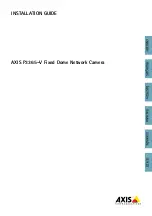
11-1
11
Appendix F Cable management
General cabling requirements
Minimum curvature radius of cables
•
Attached power cord, communication cable, or ribbon cable
—A minimum of five times the
cable’s outer diameter. If the cable is frequently bent, connected and removed, the curvature
radius must be a minimum of seven times the cable's outer diameter.
•
Ordinary attached coaxial cable
—A minimum of seven times the cable's outer diameter. If the
coaxial cable is frequently bent, connected and removed, the curvature radius must be a
minimum of 10 times the cable's outer diameter.
•
High-speed cable (SFP+ cable for example)
—A minimum of five times the cable's outer
diameter. If the coaxial cable is frequently bent, plugged and unplugged, the curvature radius
must be a minimum of 10 times the cable's outer diameter.
Minimum curvature radius of fibers
•
When the fiber is wrapped up around the cabling plate, the diameter of the cabling plate must
be a minimum of 25 times the fiber's diameter.
•
When the fiber is being moved, the curvature radius of the fiber must be a minimum of 20 times
the fiber's diameter.
•
When the fiber is attached, the curvature radius of the fiber must be a minimum of 10 times the
fiber's diameter.
NOTE:
The fiber's diameter refers to the outer diameter of the fiber jacket. Typically, the diameter of a
single-core fiber is 0.9 mm (0.04 in), 2.0 mm (0.08 in), or 3.0 mm (0.12 in).
Cable binding guidelines
When you route and bundle up cables, follow these guidelines:
•
Label cables before you route or bundle them. For more information about labeling cables, see
"Appendix E Engineering labels."
•
Bind and route the cables neatly inside the rack, and make sure they are not kinked or bent.
Figure11-1 Correct and incorrect cable binding
Tangled
Bent













































